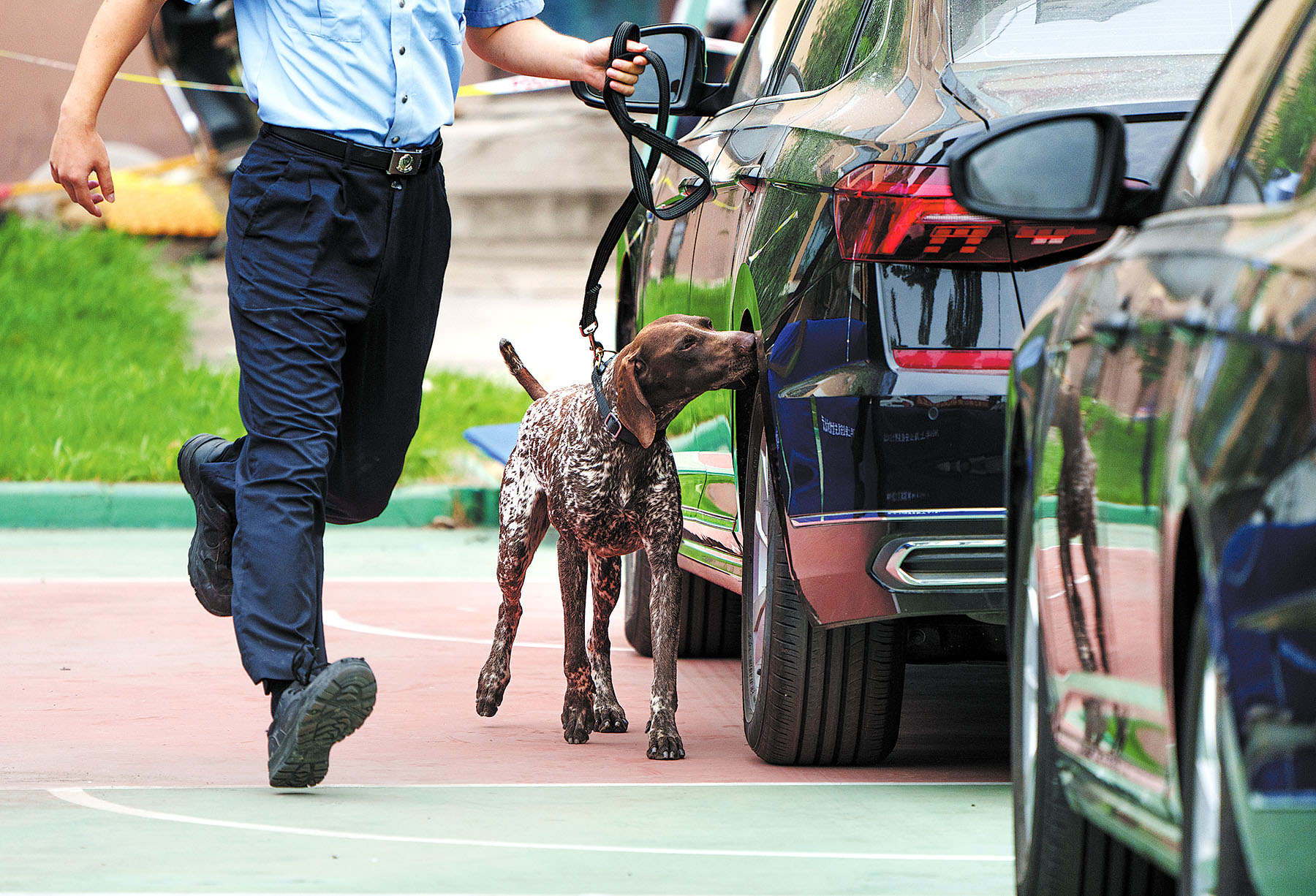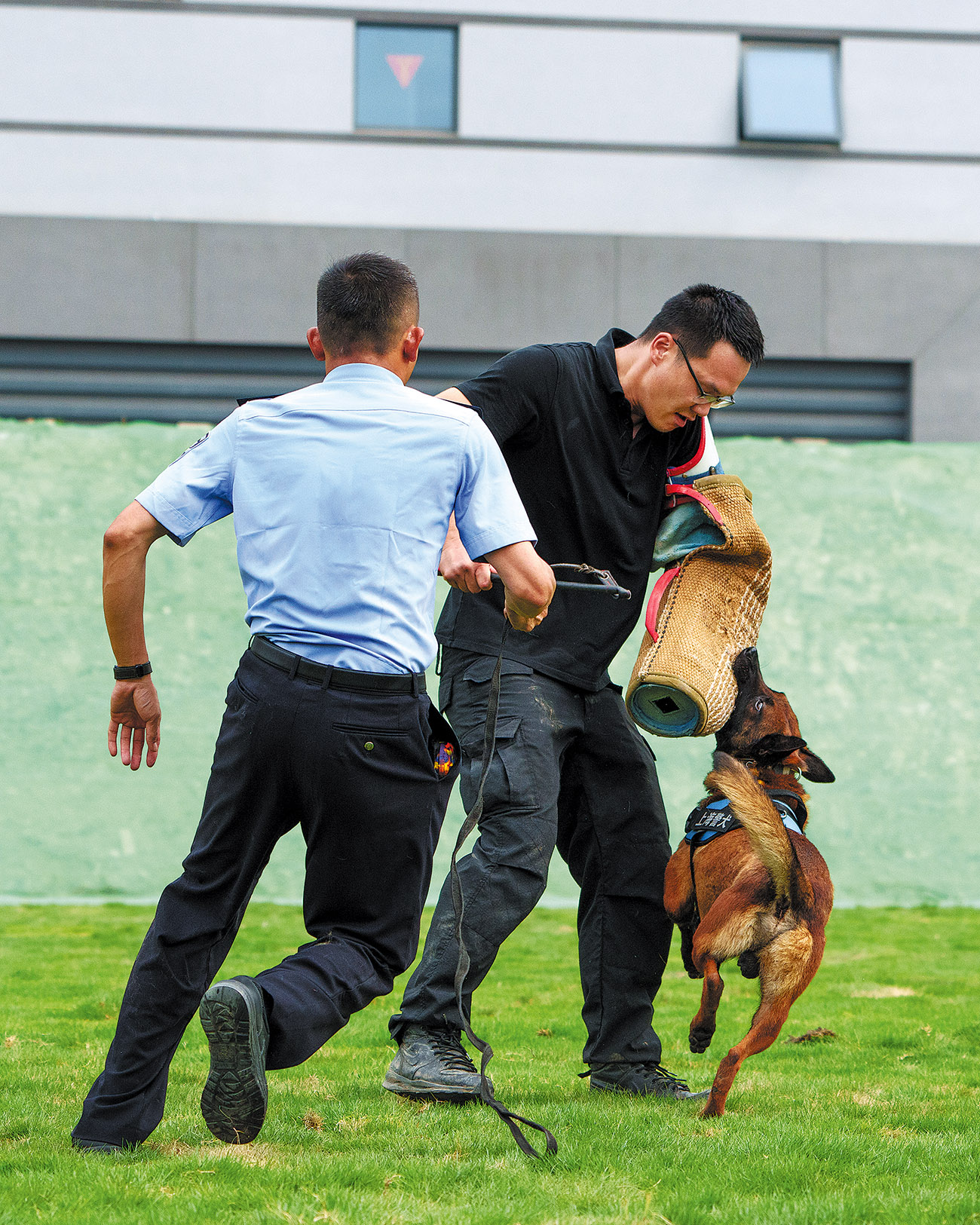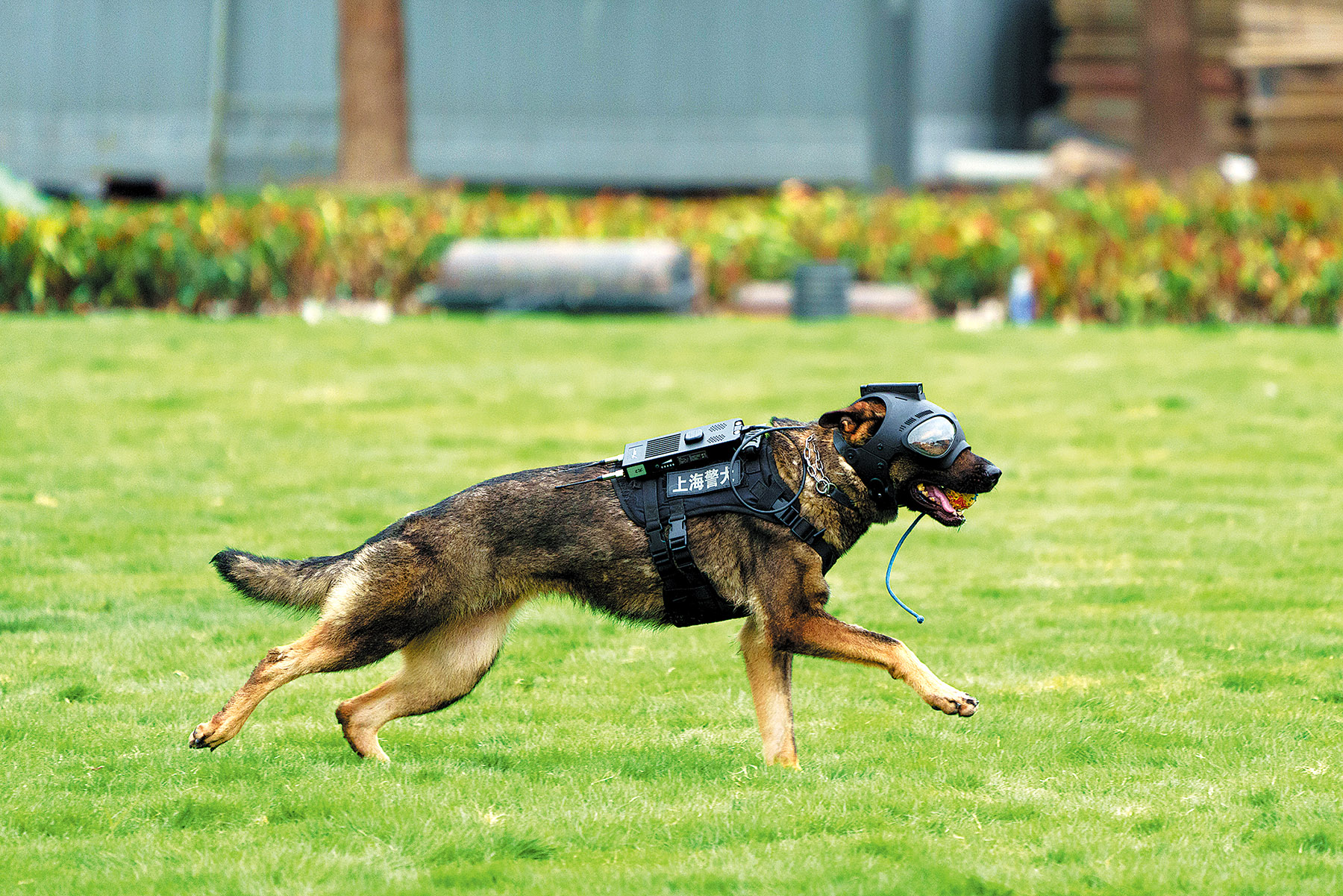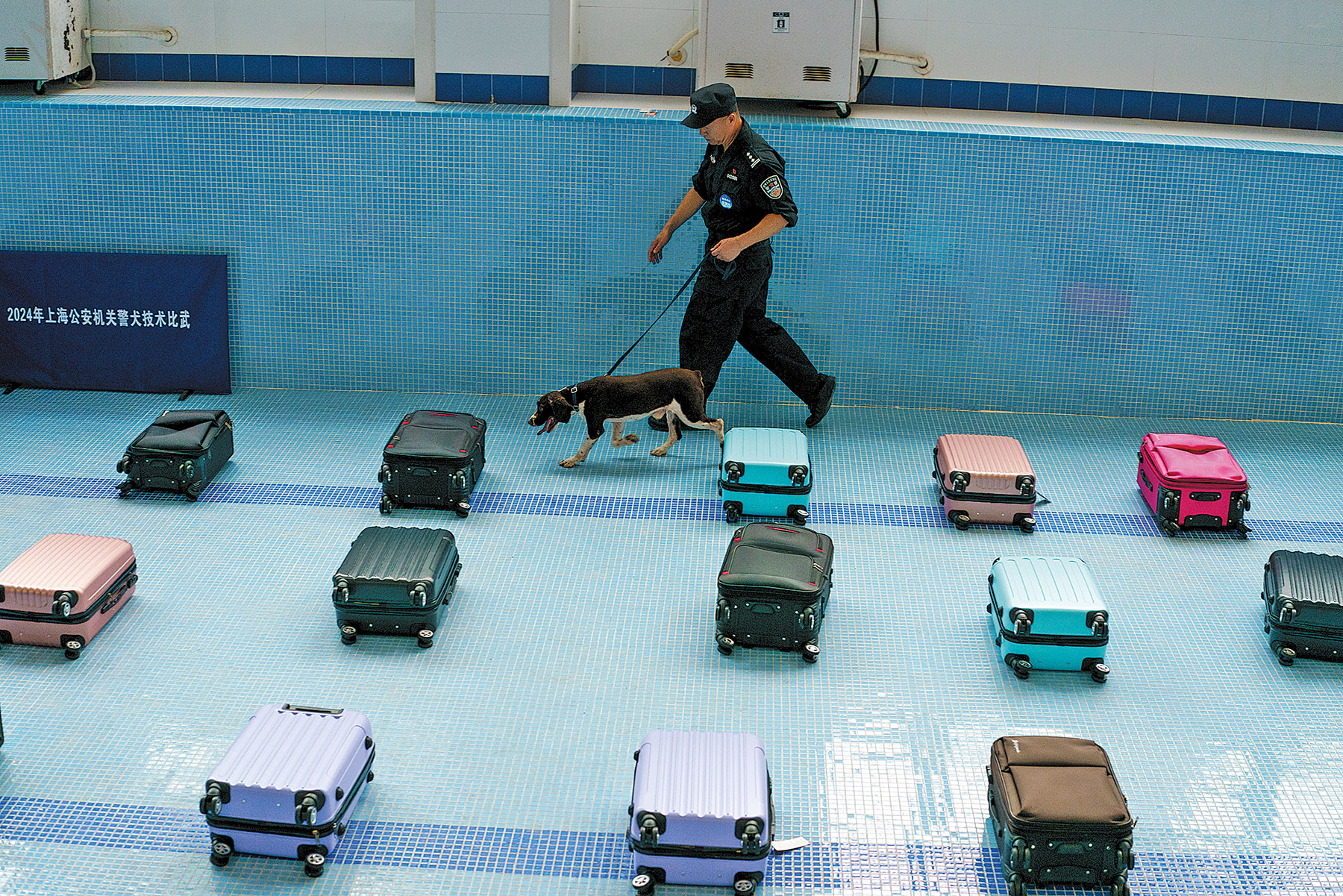Handlers develop strong bond to motivate dogs to tackle tough and dangerous crimes, Wang Xin reports.

Zhang Guohui, 54, a K-9 officer from the 10th detachment of the Shanghai Public Bureau's criminal investigation department, has been handling police dogs for over three decades.
Partnering with Henry, a 5-year-old English Springer Spaniel, Zhang won first place in the drug detection program during the Shanghai Public Security Bureau Police Dog Technical Competition on July 10.
During the three-day competition, over 70 police dogs of more than 10 breeds showcased their skills in tracking, evidence search, blood detection, manhunt, drug detection, explosive detection and basic obedience.
READ MORE: Meet China's first corgi police dog
In addition to popular police dog breeds such as the tall and powerful German Shepherd, Malinois and Labrador retrievers, small breeds such as the Jack Russell Terrier and English Springer Spaniel are among the competitors.
A total of 73 handlers representing 19 teams from across the bureau participated in the competition, aiming to secure a spot in the national police dog technical competition later this year, according to the bureau's criminal investigation department, the contest's leading organizer.
A K-9 officer is a law enforcement agent who handles and uses the skills of police dogs to assist in the execution of duties such as drug detection, cadaver location, manhunts and explosives identification. A police dog, also known as a K-9 or K9 canine, is specifically trained to assist these officers.
Police dogs play a unique and irreplaceable role in public security work, as they boast natural biological advantages in sectors such as odor tracking, evidence search, security patrols, explosion prevention and emergency handling.
"Although digitalization and informatization are widely used in solving crimes, police dogs still play an irreplaceable and ingenious role in some areas, especially in complex conditions without monitoring systems such as forests, mountains, city outskirts and suburbs," says Chen Chuan, head officer of the K-9 team at the 10th detachment of the Shanghai Public Bureau's criminal investigation department.
Chen points out that Shanghai has used police dogs in criminal investigations for over 70 years. In addition to joining other teams with police dogs to support in solving crimes, the K-9 team also shoulders the duties of breeding and training police dogs.

Currently, there are about 26 handlers on the K-9 team. Zhang, a handler since 1992, is one of them.
"It is physical and mental hard work, as well as skilled work. Police dog training is scientific and systematic and based on their neurotype and characteristics. Handlers must be very patient during the whole training process, as they have to repeat the same moves countless times to form one reflex in the dogs. It may take a month for the handler and the dog to form a conditioned reflex to one action," says Zhang.
On average, a police dog can serve for eight years. As fixed assets of the bureau, police dogs are bred on demand and training usually begins when the puppies are two or three months old.
Zhang explains that puppies will go through basic training and testing in various dimensions — their reactions while walking outside and hearing loud sounds like firecrackers, their adaptability to riding in vehicles, their motivation and possession of food and objects, and their level of obedience to the handlers, for instance.
After six months of early training and evaluations, the puppies go into formal training programs based on their features.

The training period may differ from the programs and scenarios where newborn K-9 units are working. It usually takes another three to four months to build drug and explosive detection skills, seven to eight months to adapt to complicated working environments such as railway stations, ports and airports, and more than a year to train a tracking police dog, Zhang adds.
"You must put your emotions, heart and hard work into the training. Training a police dog is sometimes like 'dating', as it requires diverse and changing methods to keep them motivated," says Zhang with a smile.
Over the past three decades, Zhang has handled over 15 police dogs and now handles three K-9 dogs, including a Malinois for tracking, an English Springer Spaniel for blood detection and Henry, the 5-year-old English Springer Spaniel, for drugs and explosives detection.
Zhang's teammate, 29-year-old Zhou Yuanting, handles multiple police dogs too. Graduating from the Criminal Investigation Police University of China in 2017, Zhou handles five K-9 dogs, among which is Lie Huo, a 7-year-old German shepherd who won the manhunt program during the competition.
Normally, a police dog is bound with one handler throughout its service. However, Zhou is Lie Huo's second handler, taking over the energetic police dog when he was 4 years old.

"Lie Huo started serving the police at 2 or 3 years old. He has a strong personality and was not easy to handle. Sometimes he could be a bit too irritable or excited to calm down at work … When I took him over, I made efforts to find the right way to build trust with him and motivate him. For both of us, training is like a game. We play and we train," says Zhou, who, like her other teammates, labels her police dogs as "comrades in arms".
Since 2023, the K-9 team has participated in the investigation of 51 major criminal cases and completed 15 major national security tasks assigned by the Ministry of Public Security, ranking first in several national combat competitions.
The Shanghai police will continue to strengthen the professional training of police dogs and promote the standardization and application of police dog technologies, contributing to social security stability, according to the bureau.
As information technologies are increasingly applied in public security, police dog technology is also advancing into a digital era. Chen Jiajun and his K-9 "comrade" Tank are testing new equipment.
ALSO READ: Paws for empowerment
Jointly developed with Shanghai K9 Intelligent Technology Co, the equipment enables handlers to command the police dog remotely during dangerous crimes or rescue scenes where the handler and police dog cannot go together.
Apart from crime investigations, police dogs are also making eye-catching contributions to raising public awareness of public security.
"Most people have a special affinity with animals and are curious about how police dog work. So, with the police dogs, we are participating in many activities to raise public security knowledge and promote the mutual trust between the police and the public," says Chen.
Contact the writer at wangxin2@chinadaily.com.cn


